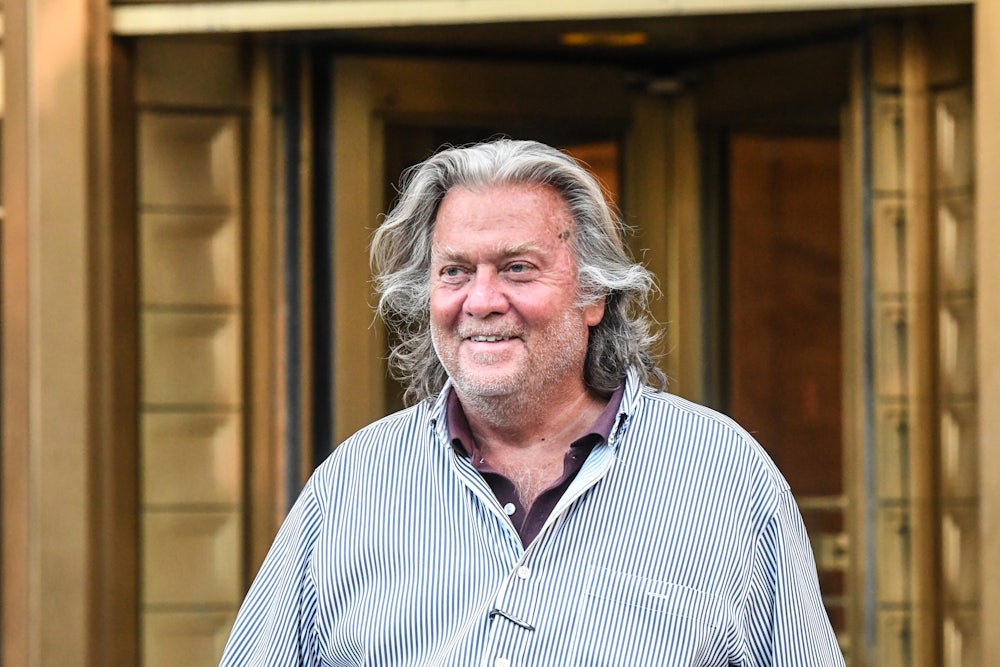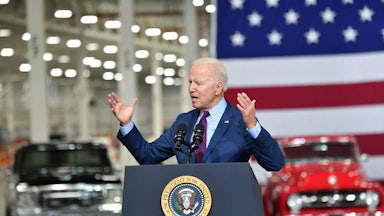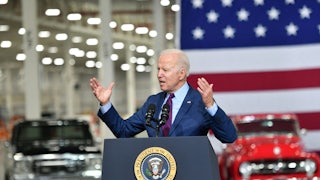Former Trump campaign manager Steve Bannon, indicted on charges of fraud and money laundering last summer, is plotting a political comeback. And going by his appearance last week at a madcap “cyber symposium” hosted by MyPillow CEO Mike Lindell, he seems to have his sights set on Brazil. South America’s largest and most populous country could be on the precipice of seeing its 2022 election turned into MAGA’s last stand.
Lindell’s cyber symposium was dedicated to the baseless notion that the 2020 U.S. presidential election was somehow stolen from Donald Trump. Bannon gave a curious performance. First he criticized Lindell for not providing enough evidence for the otherwise “very powerful” stolen election theory. Then he warned that a different election might be at risk: the reelection of far-right authoritarian president Jair Bolsonaro of Brazil.
Bolsonaro’s son Eduardo, a Brazilian congressman, also attended Lindell’s conspiratorial shindig. He was there to draw specious parallels between his country’s electoral system and that of the United States—a bad comparison, since Latin America’s largest nation has a world-class electronic voting system, mandatory voting, and not a single credible case of fraud in 25 years. Despite winning a resounding victory in 2018, President Bolsonaro has taken to openly questioning whether Brazil can carry out a free and fair election next year, and engaged in a quixotic push to change the way Brazilians vote. He has even raised the prospect of military intervention to supposedly ensure the integrity of the vote, parading army tanks and troops in Brasília on August 10. To all but his most ardent supporters, the president’s real intentions are obvious. He is preparing to reject an unfavorable future outcome by sowing doubt now.
After Eduardo addressed Lindell’s audience, Bannon took the stage and called next year’s presidential race in Brazil the “second most important election in the world,” blithely asserting that “Bolsonaro will win unless it’s stolen by, guess what, the machines.” In reality, every major polling outfit for months has predicted Bolsonaro will lose badly to former president Luiz Inácio Lula da Silva, head of the center-left Workers’ Party and the most prominent voice of the opposition. Brazilians, not “machines,” seem intent on ousting Bolsonaro. But Bannon dismissed Lula as “a criminal,” calling him “the most dangerous leftist in the world.”
Bannon was echoing the hyperbolic rhetoric that Brazilian conservatives have long used to describe Lula, a former union leader who became the first working-class president in Brazilian history upon his election in 2002. Even before Bolsonaro’s election, center-right politics in Brazil were becoming defined by the dangerously misguided notion that Lula and his party were not simply democratic opponents to be defeated at the ballot box but criminal conspirators to be extirpated by any means necessary.
Eduardo Bolsonaro’s appearance at Lindell’s event appears to be the next step in this strategy. Bolsonaro is now attempting to link events in Brazil to the broader network of fantastical delusions, resentments, and outrages that fuel the Trump base and, by extension, much of the Republican Party. Bolsonaro—with Bannon apparently on his side—wants to make Brazil the next MAGA battleground.
This isn’t the first time Bannon has tried to take his show on the road. Three years ago, Bannon visited several countries in Europe and beyond in an attempt to stitch together a transnational network of right-wing nationalists who could jointly withstand what he considers to be the noxious tides of globalization. As Ian Buruma wrote for Project Syndicate at the time, “Bannon sees this effort as part of a ‘war’ between populism and ‘the party of Davos,’ between the white, Christian, patriotic ‘real people’ (in the words of his British supporter, Nigel Farage) and the cosmopolitan globalist elites.” A boastful Bannon proclaimed that “we’re open for business.... We’re a populist, nationalist NGO, and we’re global.”
Despite his meetings with France’s Marine Le Pen, Italy’s Deputy Prime Minister Matteo Salvini, and Hungary’s authoritarian Prime Minister (and Tucker Carlson’s new idol) Viktor Orbán, Bannon’s so-called Movement had little discernible impact on European politics. This is because, despite the aura of penetrating insight he cultivated as Trump’s Svengali, Bannon doesn’t actually know much about how the world works.
“While on tour, Bannon’s diatribes tend to focus on Trump, his miraculous election victory, and the president’s vision of tearing down the ‘global liberal elite,’” Prague-based journalist Tim Gosling observed in Foreign Policy in 2018. Bannon thrives when serving up the warmed-over remains of Trump’s shocking upset, but has never managed to come up with new recipes that can be tested elsewhere. “He pushes all the right buttons: defense spending, trade imbalances, and Crooked Hillary. But Bannon does it from a blinkered Washington perspective,” Gosling wrote. Bannon’s foreign incursions were self-serving mythmaking exercises, grist for an ongoing grift. Not until now, with Bolsonaro, has Bannon found a foreign far-right movement thoroughly interested in this Washington-centric approach. Bolsonaro’s sons and supporters are thrilled by Bannon’s support in ways that European conservatives never were.
Brazilians outside the far right, however, were immediately concerned by the Bolsonaro-Bannon alliance on display at Lindell’s event. Writing for The Intercept Brasil this past Sunday, journalist João Filho said Bannon’s involvement should be seen as a sure sign that the 2022 election will be contested. “Even if Bolsonaro is not re-elected,” he fretted, “Bolsonarismo will remain alive. And they will continue to use Bannon’s know-how and invest in conspiracies against democracy.” Thomas Traumann, a well-connected and highly respected political observer writing for weekly news magazine Veja, described Bannon as the link between Bolsonaro’s “tropical version of Trumpism” and the current insurrectionary paranoia that has gripped Trump’s true believers. Ciro Gomes, a former governor, cabinet minister, and congressman who will seek the Brazilian presidency for the fourth time next year, has harped on the Bannon-Bolsonaro connection since 2018, decrying the influence that Trump’s erstwhile adviser has had over the Brazilian president. Bannon’s ability to shape political outcomes around the world may be overstated, but his involvement will likely draw the attention of American ultraconservatives to an election that they might otherwise have overlooked.
Bannon endorsed Jair Bolsonaro in Brazil’s 2018 election, and met with Eduardo that year as well. After their conversation, Eduardo announced his and Bannon’s intent “to join forces, especially against cultural Marxism.” Last year, Bolsonaro and his sons openly rooted for Trump to win reelection, sensing that a Biden victory would isolate and constrain the Brazilian government for its careless handling of Amazonian deforestation, among other issues that have raised international alarm. It is not clear, however, that Bannon has followed Bolsonaro’s administration particularly closely.
Up until now, the Brazilian president’s steadfast support of Trump has gone without much public reciprocity from either Trump or his supporters. Bolsonaro stalled for over a month before recognizing Biden’s victory. Tactlessly, he reportedly repeated false allegations about fraud in the 2020 U.S. election in a meeting this month with Biden’s national security adviser. And while in the United States for Lindell’s symposium, Eduardo met with Trump and invited him to visit Brazil. Bannon’s endorsement of the Bolsonaro claim that the election will be stolen represents the kind of MAGA world validation that the far right in Brazil, slavishly attuned to the U.S. right wing for inspiration, craves.
Despite their well-documented tensions, Bannon remains closely associated with Trump, always receiving at least partial credit for the surprise victory in 2016. As a result, the Bolsonaro clan remains drawn to him. As Bannon signals his willingness to engage in the 2022 Brazilian election, his relationship with the Bolsonaros might become clearer. It is not unusual for U.S. political strategists to take their services overseas, of course. It’s unlikely that Bannon could guide Bolsonaro to victory—but legitimate victory is probably not the point. Bannon’s main pursuit is grievance, victory merely a happy accident. The Bolsonaros are offering Bannon a chance to be a player in a major democracy’s high-stakes election, to be fawned over by unthinking partisans, and, of course, to keep the grift alive.








